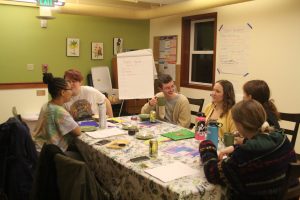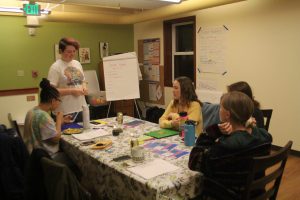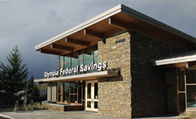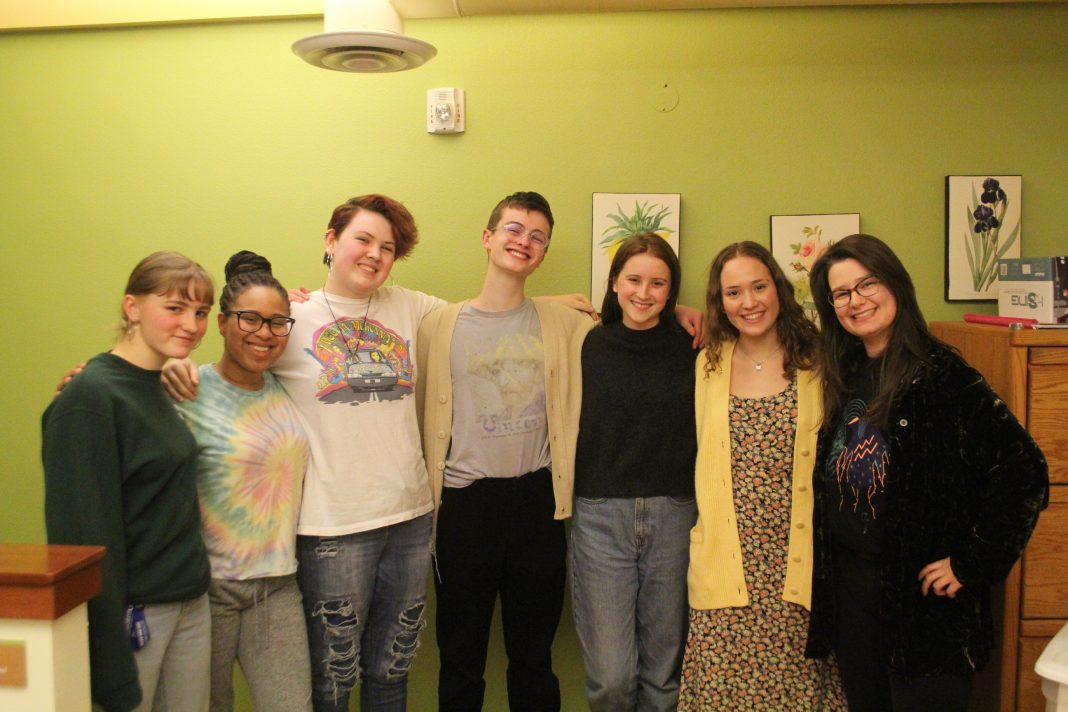Every Monday night in a dining room, a vital meeting takes place. A small group of teens sit under warm lighting around a wooden table. Every now and then, someone gets up to make tea, get a new can of sparkling water, or another snack from the kitchenette. The mood is comfortable, relaxed. Even though the serious subjects of teen dating violence, body positivity, and healthy relationships are brought up, the conversation doesn’t feel downhearted. The group chats like old friends, listening to each other’s stories, and laughing often.
This friendly dining room is on the second floor of SafePlace, located in downtown Olympia. SafePlace is a domestic violence and sexual assault services agency. The organization provides resources, including a shelter, hospital advocates, and a 24/7 crisis phone line to individuals dealing with these traumatic experiences. One of the programs they operate is SPEAK (SafePlace Peer Education Action and Knowledge), a collection of strong-willed and activism-minded teens from around Thurston County.
On February 25, I was a guest at a weekly meeting. The group watched a video, read several articles, and discussed body positivity, which is the movement that promotes the concept that all bodies are worthy of love and respect. They specifically focused on confidence, how the body positivity movement affects people with disabilities, and how appearance doesn’t always equate to physical and mental health. In addition to this topic, SPEAK also talked about healthy relationships, events, an upcoming conference the group will speak at, and a presentation at a River Ridge High SchoolPizza Klatch meeting.

The group, facilitated by SafePlace Youth Education Specialist, Sierra Abrams, consists of seven local teens who participate in social justice activities and peer education. She says SPEAK works to “understand the root causes of domestic violence and sexual assault.” She adds, “another part of my job is to go to schools and do presentations about healthy relationships. Something that SPEAK does is go with me [to] help educate their peers. They learn, and then they bring it out into the world.” These presentations are the primary way SPEAK members are involved in peer education about healthy relationships, which include romantic relationships, parental relationships, and even friendships. In addition to presenting at 10 high schools and 3 middle schools, SPEAK visits other, non-school locations that teens are in, such as juvenile detention centers, GRuB, and the YWCA. This allows them to reach a diverse student population.
This is Sierra’s second year in the role of facilitator, although SPEAK was formed six years ago. She says, “In 2013, SafePlace did a community needs assessment where they went out into the community and talked to people about what was going on for [them]. What they heard a lot, mostly from survivors of domestic violence and sexual assault, was that young people really needed to know more about these topics.”
Sierra feels SPEAK is a vital program, not just in spite of the serious subject material, but even because of it. “I feel like it’s not often that youth get to really have a strong voice about these things. A lot of what I felt as a high schooler and what I see is that when young people are trying to talk about violence in their relationships, it’s dismissed. It’s like, ‘You’re 16, what do you know about having a relationship?’” She adds, “[SPEAK] gives high schoolers a place to talk about these things in a space that is really comfortable and fun.”

At the rectangular dining room table, the teens start their meeting by doing a “check-in,” discussing how they have been doing since their last meeting. Some report exciting news, others state they’ve been dealing with complicated situations. Either way, the members are able to enter the meeting in whatever state they’re in. Anecdotes are laughed over as tea steeps. Empathetic ears listen to stories by those who are struggling over bowls of popcorn. About halfway through the agenda, the teens share current favorite TV shows, movies, and music. As the media recommendations are discussed, others nod along or write down the titles. The end of the meeting is similar to the beginning. Everyone checks out by discussing their self-care plans for the rest of the evening. Each person present has a different way they’re going to take care of themselves – reading, eating, doing homework, going to bed. Laughter can be heard as the teens filter downstairs and outside. Several linger in the icy parking lot, still deep in conversation.
If you are interested in supporting SafePlace and their vital services in general, please email safeplace@safeplaceolympia.org, visit their website, or call their business line at 360-786-8754. They also have an online wishlist that details the types of donations they need, which include items like old cell phones that can be given to survivors as an emergency phone. In addition to donations, you can take a volunteer training a few times a year to become either an administrative volunteer or an advocate that works directly with survivors.
SPEAK runs from fall to spring, and also has an upcoming summer program. For teens interested in becoming SPEAK members, please contact Sierra Abrams at sierraa@safeplaceolympia.org to find out more information and to submit an application.

















































